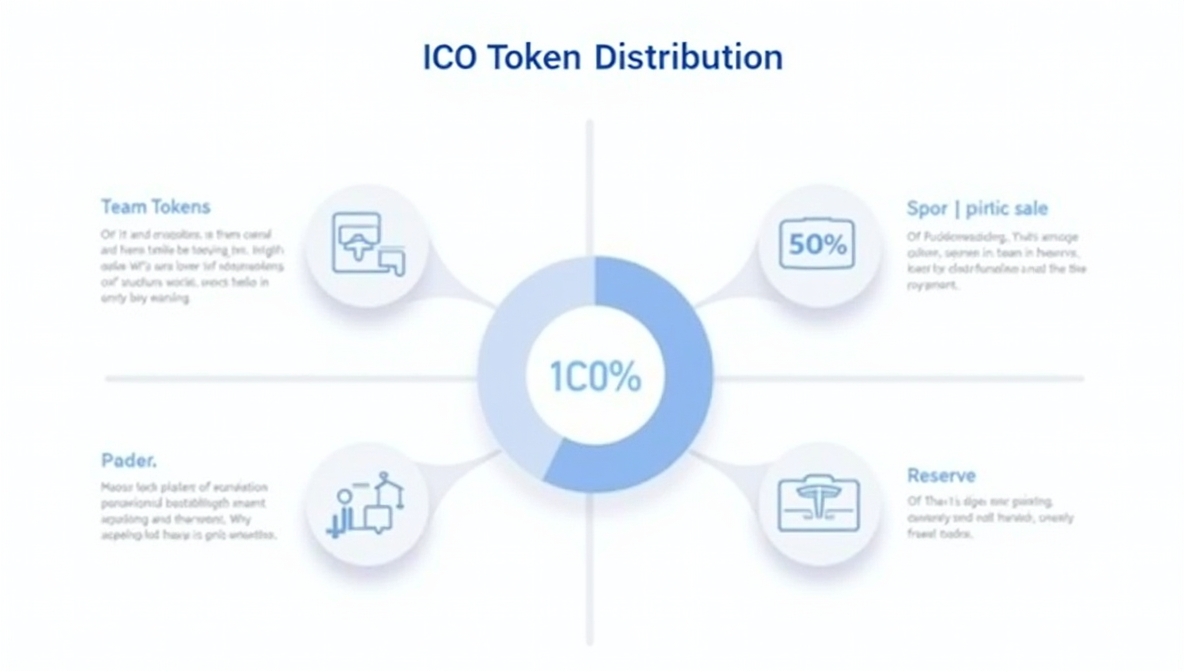Are you pioneering the next wave of the internet with groundbreaking Web3 applications, innovative NFTs, or transformative DAOs? The allure of a user-centric, decentralized digital realm is undeniable. However, the journey to realizing this vision is fraught with intricate legal requirements for web3 startups. Ignoring these critical aspects is akin to constructing a technological marvel on unstable legal ground impressive in theory, but vulnerable in practice.
This essential guide directly addresses this: a deep understanding and strict adherence to legal requirements for web3 startups are non-negotiable for your venture’s longevity and success. Within this article, you will dissect the core legal challenges, gain crucial insights into navigating the evolving regulatory landscape, and acquire actionable strategies for robust web3 startup legal compliance. Our aim is to empower you to build not just an innovative Web3 project, but a legally sound and thriving enterprise.
Understanding Web3 Legalities
The legal landscape governing web3 startup legal compliance is fundamentally different from that of traditional businesses. Imagine navigating uncharted territory without a definitive map this is the reality for Web3 founders. Unlike conventional startups operating within established legal parameters, Web3 ventures often operate at the technological vanguard, challenging existing regulatory frameworks. This inherent novelty presents both significant opportunities and considerable legal ambiguities.
While Web3’s decentralized nature offers advantages like enhanced transparency and community governance, it simultaneously complicates jurisdictional issues and regulatory oversight. The core distinction between traditional and regulatory considerations for web3 startups lies in the underlying technologies. Smart contracts, DAOs, and tokenized assets introduce novel legal questions that traditional legal systems are actively grappling with.
Consider the seminal case of the DAO hack in 2016. This decentralized autonomous organization, built on the Ethereum blockchain, suffered an exploit due to vulnerabilities in its smart contract code, resulting in the theft of millions of dollars in Ether. This event brought to the forefront a critical legal question: who bears legal responsibility when an autonomously executing smart contract leads to financial loss? Traditional legal frameworks struggle to assign liability in such decentralized scenarios.
Similarly, the rapid proliferation of Non-Fungible Tokens (NFTs) has ignited debates surrounding intellectual property rights and the legal implications of digital ownership. The ongoing legal battle involving Yuga Labs, the creators of the Bored Ape Yacht Club NFTs, exemplifies the complexities of enforcing IP rights in the decentralized digital sphere. These real-world examples underscore the importance of understanding the legal challenges in web3 startup formation.
Currently, a globally unified regulatory framework specifically designed for Web3 does not exist. Instead, existing laws pertaining to securities, financial services, data privacy, and intellectual property are being applied and interpreted within the context of these emerging technologies. This fragmented regulatory environment necessitates a proactive and meticulously informed legal strategy for any aspiring Web3 entrepreneur. Think of it as navigating a complex maze where the walls are constantly shifting. Staying informed and adaptable is paramount to finding your way.
Key Legal Considerations for Web3 Startups
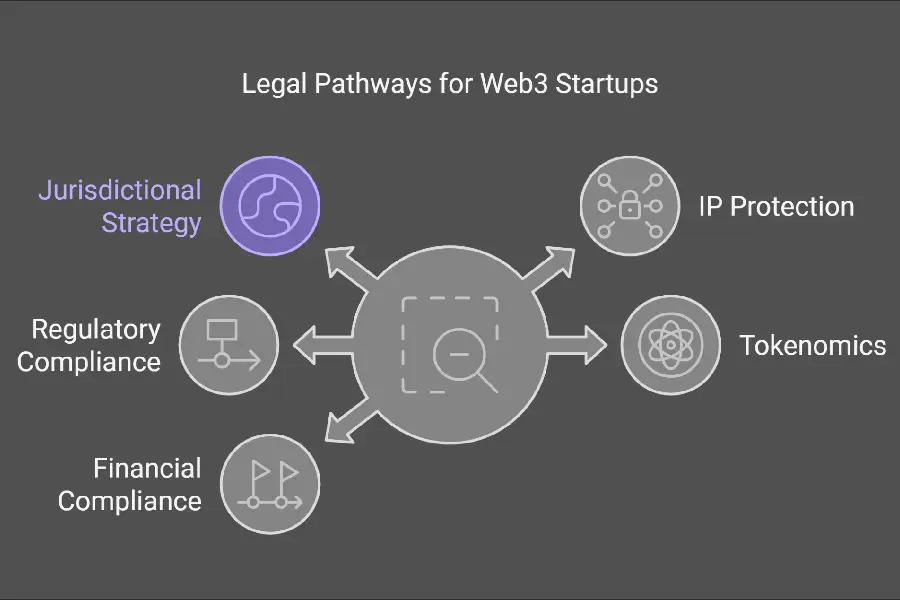
Successfully navigating the legal complexities of Web3 demands a comprehensive and multi-faceted approach. Here are the essential legal considerations that every Web3 startup must meticulously address to establish a robust and compliant foundation:
Jurisdictional Strategy
Selecting the appropriate jurisdiction for incorporation is a foundational decision with significant long-term legal and tax implications for your web3 startup legal compliance. Unlike traditional businesses with primarily localized operations, Web3 startups often possess a global reach from their inception, making the choice of legal domicile even more critical and strategic. Key factors to meticulously evaluate include the prevailing regulatory environment for crypto assets, the intricacies of tax laws, the stringency of data protection regulations, and the overall ease of conducting business within that jurisdiction.
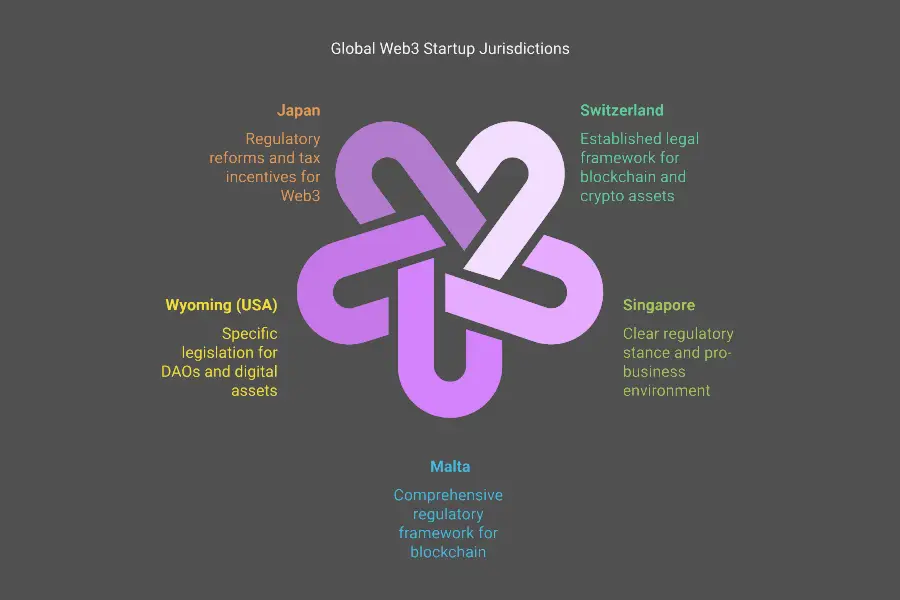
“Several jurisdictions have emerged as attractive hubs for Web3 innovation due to their relatively progressive and accommodating regulatory frameworks. These include Switzerland, known for its established legal framework for blockchain and crypto assets; Singapore, recognized for its clear regulatory stance and pro-business environment; Malta, which has actively positioned itself as a ‘blockchain island’; and certain states within the United States, like Wyoming, which have enacted specific legislation to accommodate DAOs and digital assets.
Additionally, Japan has been accelerating its Web3 regulatory reforms, aiming to attract global businesses and investors, with the 2025 Osaka Expo expected to be a key showcase for Web3 innovations. However, the “optimal” jurisdiction is not a one-size-fits-all solution. It depends entirely on the specific nature of your Web3 project, your target audience demographics, your long-term strategic goals, and your risk tolerance.
Thinking about where to incorporate? When evaluating potential jurisdictions, conduct a deep dive beyond surface-level assessments. Scrutinize their specific stance on crypto assets, thoroughly analyze their data privacy laws (such as GDPR in the EU or CCPA in California), and assess the availability of relevant talent pools and supporting resources. For instance, consider the case of Coinbase, a leading cryptocurrency exchange, which is incorporated in Delaware, a state known for its business-friendly corporate laws.
Another strategic move could involve establishing a separate Development Laboratory Company in a jurisdiction renowned for its tech-friendly environment and innovation incentives, even if your primary operating entity is located elsewhere. This strategic separation can help isolate research and development activities, potentially benefiting from specific tax breaks or grants, as exemplified by numerous tech companies establishing R&D centers in Ireland.
Read More: Establishing a Company in DIFC: 2025 Full Guide
IP Protection Framework
Protecting your intellectual property is paramount in the fiercely competitive Web3 landscape. This encompasses a wide range of assets, including your proprietary source code, unique algorithms, distinctive branding elements, and any other novel technological innovations that give your project a competitive edge. However, the inherent open-source ethos prevalent in many Web3 projects presents unique challenges to traditional IP protection strategies.
While you might strategically choose to open-source certain aspects of your project to foster community engagement, encourage collaboration, and build network effects, it is absolutely crucial to strategically protect your core, differentiating innovations. This often involves a multi-pronged approach, combining traditional methods like patents for novel inventions, trademarks for your brand name and logos, and copyright for your original code and creative content. Furthermore, clearly defining the licensing terms for your open-source code is essential to prevent unauthorized commercial exploitation while still encouraging community contributions. For example, the MIT License and the Apache License 2.0 are popular open-source licenses that grant users broad permissions while still providing some level of protection for the original creators.
Important to remember: Secure Your Web3 Innovations! Don’t leave your groundbreaking Web3 innovations vulnerable to copycats or unauthorized use. Implement robust IP protection strategies right from the outset. Consider the case of Yuga Labs, despite facing IP challenges, they actively pursue trademark protection for their Bored Ape Yacht Club brand, demonstrating the importance of securing brand identity.
When collaborating with developers, particularly in decentralized or remote settings, robust NDAs (Non-Disclosure Agreements) and IP Assignment Agreements are not merely recommended they are non-negotiable legal safeguards. These legally binding agreements ensure that any intellectual property created during the development process is unequivocally assigned to your startup, preventing future disputes over ownership and usage rights. Imagine a scenario where a freelance developer contributes significantly to your project’s core code but hasn’t signed an IP assignment agreement. They could potentially claim ownership of that code, creating significant legal headaches for your startup down the line.
Regulatory Compliance Strategy
Regulatory compliance is arguably the most intricate and rapidly evolving aspect of the legal requirements for web3 startups. Different jurisdictions across the globe are adopting vastly different approaches to regulating crypto assets and Web3 technologies, creating a complex and often confusing landscape for startups operating internationally. Understanding these jurisdictional nuances is absolutely crucial to avoid costly legal pitfalls, potential fines, and even the forced shutdown of your operations.
Markets in Crypto-Assets (MiCA) in the EU: The European Union’s comprehensive MiCA framework represents a significant and ambitious step towards harmonizing the regulation of crypto assets within its member states. However, the global regulatory landscape remains fragmented, with the US potentially adopting more innovation-friendly policies under the new administration, while countries like China maintain restrictive stances.
MiCA introduces a unified licensing regime for Crypto-Asset Service Providers (CASPs), establishes clear rules for stablecoins to ensure their stability and consumer protection, and implements measures to safeguard consumers interacting with crypto assets. If your Web3 startup intends to target the vast EU market, thoroughly understanding and diligently complying with the provisions of MiCA is not optional it’s a fundamental requirement for legal operation. For example, under MiCA, exchanges offering crypto-to-fiat trading pairs within the EU will need to obtain a CASP license.
SEC Regulations in the U.S.: In the United States, the Securities and Exchange Commission (SEC) has taken a particularly keen and active interest in the Web3 space, especially concerning the issuance and trading of digital tokens. The SEC frequently applies the Howey Test, a legal framework established by the Supreme Court, to determine whether a particular token offering constitutes an investment contract and, therefore, a security. If a token is deemed a security, its issuance and subsequent trading must comply with stringent federal securities laws, including rigorous registration requirements and disclosure obligations.
Navigating the SEC’s often nuanced and evolving stance on token offerings requires meticulous legal analysis, strategic planning, and often, seeking a “no-action letter” from the SEC to gain clarity on a specific token’s regulatory status. The SEC’s enforcement action against Ripple Labs, alleging that their XRP token was an unregistered security, serves as a stark reminder of the potential consequences of non-compliance.
Don’t forget: Secure Your Future Prioritize Compliance! Ignoring or underestimating regulatory requirements is not a viable strategy. It can lead to crippling financial penalties, protracted legal battles that drain resources, severe reputational damage, and, in the worst-case scenario, the complete shutdown of your promising Web3 venture. Think of it as navigating a minefield one wrong step can have devastating consequences.
Tokenomics and Legal Opinions
Issuing a token has become a prevalent and often essential fundraising mechanism for Web3 startups, allowing them to bootstrap development, incentivize community participation, and build a decentralized ecosystem. However, the legal implications of token issuance are substantial and demand meticulous consideration and expert guidance.
Accurately determining the legal classification of your token for example, whether it functions primarily as a utility token providing access to a platform, a security token representing ownership or debt, or a governance token granting voting rights within a DAO is absolutely paramount, as this classification directly dictates the applicable regulatory framework and compliance obligations.
Obtaining a comprehensive Token Legal Opinion from experienced legal counsel specializing in blockchain and cryptocurrency law is not merely a recommended best practice — it’s a crucial and often indispensable step before launching any token offering. With the SEC potentially easing enforcement under the new administration, startups may find more clarity in navigating token classification and compliance.
A well-researched legal opinion provides a thorough analysis of the token’s legal status across relevant jurisdictions, assesses potential securities law implications, and helps ensure your token launch aligns with applicable regulations. This opinion is far more than just a bureaucratic formality; it serves as a critical piece of due diligence, offering a legal assessment of your token’s structure and mitigating potential legal risks that could jeopardize your startup’s future. Consider the example of Blockstack (now Hiro), which underwent a Reg A+ offering with SEC qualification for its token sale, demonstrating a commitment to regulatory compliance and providing investors with a degree of legal certainty.
Furthermore, the intricate design of your tokenomics the economic model governing the creation, distribution, and use of your token and the potential for your project’s future transformation into a fully decentralized autonomous organization (DAO) have significant legal ramifications. Clearly defining the rights, obligations, and functionalities associated with your token and transparently outlining the proposed governance structure of your project are essential for achieving legal clarity, fostering investor confidence, and ensuring long-term sustainability.
Financial Compliance Measures
Web3 startups, particularly those involved in the issuance, exchange, or custody of crypto assets, are subject to stringent financial regulations primarily aimed at preventing money laundering and the financing of terrorism (AML/CFT). In 2025, the integration of AI into financial compliance systems is expected to enhance monitoring and reporting capabilities, making it easier for startups to adhere to these regulations. These regulations are designed to ensure the integrity of the financial system and prevent the use of crypto assets for illicit purposes. Compliance typically involves implementing robust Know Your Customer (KYC) procedures to thoroughly verify the identity of your users, meticulously monitoring transaction activity for suspicious patterns or red flags, and reporting any such activity to the relevant regulatory authorities.
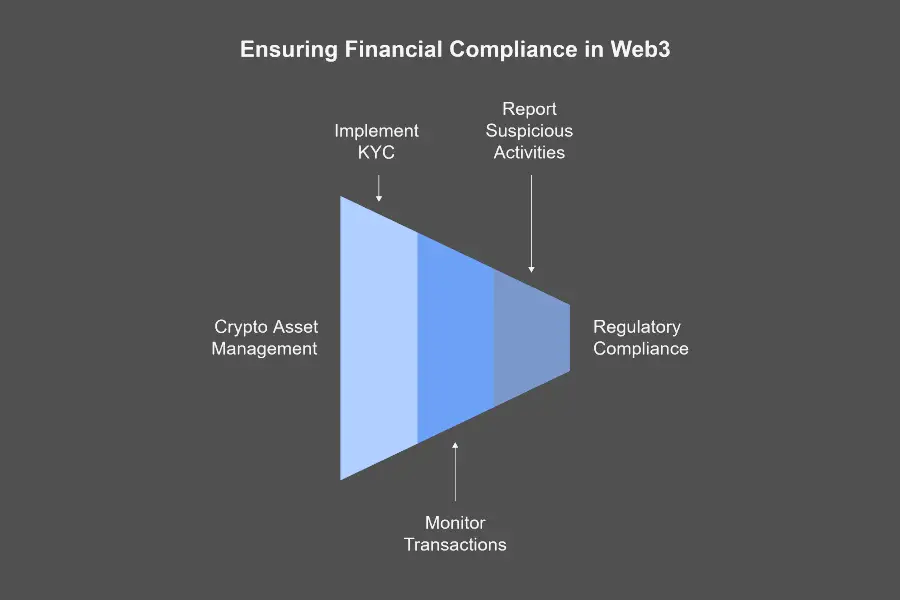
Key takeaway: Safeguard Your Reputation Implement Financial Controls! Implementing robust financial compliance measures is not just about adhering to legal requirements; it’s about protecting your startup’s reputation, building trust with your community and potential partners, and ensuring the long-term viability of your business. Think of companies like Coinbase, which have invested heavily in building robust KYC/AML compliance programs to operate within regulatory frameworks and maintain user trust.
Requirements for the secure custody and responsible administration of digital assets are also critical aspects of financial compliance for Web3 startups. Depending on the specific nature of your business operations, you may be required to comply with regulations applicable to Virtual Asset Service Providers (VASPs), which often mandate specific security protocols, segregation of client funds, and adherence to anti-money laundering guidelines. Choosing reputable and secure custody solutions and implementing robust security measures to protect user funds and sensitive data are essential for maintaining regulatory compliance and safeguarding your users’ assets.
Actionable Strategies for Web3 Legal Compliance
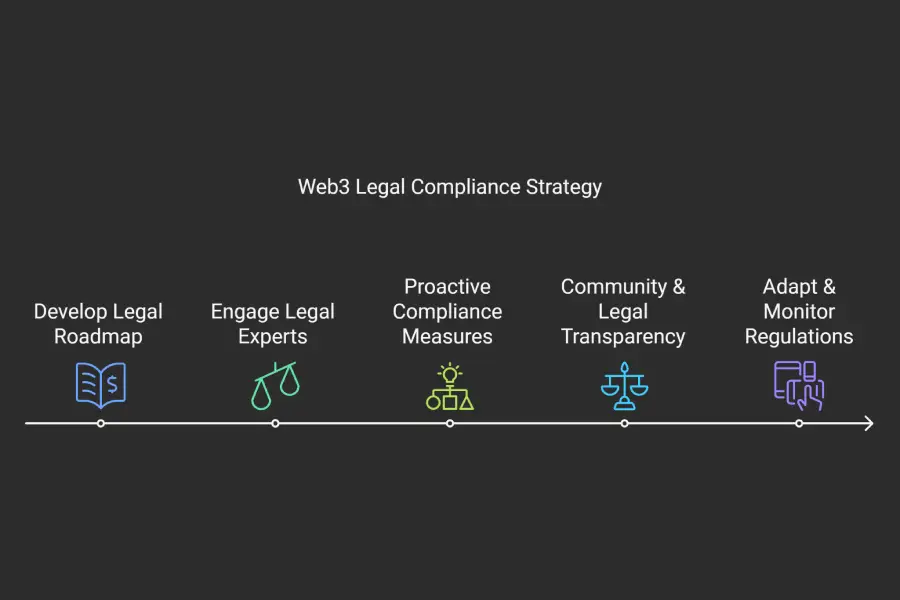
Successfully navigating the complex legal landscape of Web3 requires a proactive, strategic, and adaptable approach. Here are actionable strategies that will empower your startup to stay on the right side of the law, mitigate potential risks, and build a sustainable and compliant business:
Develop a Legal Roadmap
Creating a comprehensive legal roadmap is an indispensable first step in effectively navigating the evolving regulatory landscape of Web3. This roadmap should serve as a dynamic and living document, outlining the key legal milestones for your project’s lifecycle, proactively identifying potential legal risks and challenges, and clearly defining the specific steps necessary to achieve and maintain compliance in all relevant jurisdictions where you operate or intend to operate.
Your legal roadmap should meticulously consider and address the following critical elements:
- Jurisdictional Analysis: Conduct a thorough analysis to identify all the jurisdictions where your startup currently operates or plans to operate in the future. For each jurisdiction, meticulously research and document the applicable regulations pertaining to crypto assets, data privacy, financial services, and any other relevant legal areas.
- Token Classification: Engage legal counsel to definitively determine the legal classification of your token in each relevant jurisdiction. Understand the implications of being classified as a security token, utility token, or other type of digital asset, and the corresponding regulatory requirements.
- Data Privacy Compliance: Develop a comprehensive strategy for complying with all applicable data privacy regulations, such as GDPR in the European Union, CCPA in California, and other regional or national laws. Outline your procedures for obtaining user consent, handling data subject requests, and ensuring data security.
- AML/CFT Compliance: Detail your startup’s Anti-Money Laundering and Counter-Financing of Terrorism (AML/CFT) compliance program. This should include your Know Your Customer (KYC) procedures for verifying user identities, your transaction monitoring processes for detecting suspicious activity, and your reporting mechanisms for suspicious transactions.
- IP Protection Strategy: Document your comprehensive strategy for protecting your intellectual property assets. This should outline the specific types of IP you intend to protect (e.g., patents, trademarks, copyrights), the steps you will take to secure those protections, and your enforcement strategy for addressing potential infringements.
Engage Legal Experts
Given the inherent complexity and the constantly evolving nature of Web3 regulations, engaging with experienced legal counsel who specialize in blockchain and cryptocurrency regulations is not merely a prudent decision it’s an absolute necessity for any Web3 startup seeking long-term success and legal compliance. Seasoned legal professionals with expertise in this niche area can provide invaluable guidance on structuring your business in a legally sound manner, navigating the intricate web of regulatory requirements, and proactively mitigating potential legal risks that could otherwise derail your project.
Remember this: Secure Expert Guidance for Peace of Mind! Think of the cost of legal counsel as an investment in your startup’s future, not just an expense. Investing in expert legal advice early on can save you significant amounts of time, money, and immense stress in the long run by preventing costly mistakes and ensuring you are operating within the bounds of the law.
When selecting legal counsel, look for professionals with a demonstrable track record of success in the Web3 space and a deep, nuanced understanding of the relevant regulations in your target jurisdictions. They can provide critical assistance with:
- Structuring your token offering to ensure compliance with applicable securities laws and avoid potential enforcement actions.
- Drafting legally sound and comprehensive terms of service, privacy policies, and other essential legal documents that protect your startup and your users.
- Navigating the often-complex licensing requirements that may apply to your specific Web3 business model, such as licenses for virtual asset service providers or money transmitters.
- Representing your startup in the event of any regulatory inquiries, investigations, or legal disputes, protecting your interests and navigating the legal process.
Proactive Compliance Measures
The regulatory landscape for Web3 is not static; it’s in a constant state of flux, with new regulations being introduced, existing rules being updated, and legal interpretations evolving. Adopting a proactive and forward-thinking approach to compliance is absolutely crucial for staying ahead of the curve and avoiding potential legal issues that could arise from being caught off guard by regulatory changes. This involves actively and continuously monitoring regulatory developments, engaging with relevant industry associations and working groups, and being prepared to adapt your strategies and operational procedures as needed to maintain compliance.
Keep this in mind: Stay Informed and Adapt Continuously! Make it a priority to stay informed about the latest regulatory changes and emerging legal trends in the Web3 space. Subscribe to industry newsletters from reputable sources, actively participate in relevant conferences and webinars, and engage in online forums and communities where legal and regulatory developments are discussed.
Foster a strong culture of compliance within your organization, ensuring that it’s not just a legal department concern but a company-wide priority. Educate your entire team about the relevant legal requirements that impact their roles and responsibilities, and ensure that compliance considerations are seamlessly integrated into your development processes, operational workflows, and decision-making frameworks.
Read More: How to Form a Company in the ADGM? Full Guide on Abu Dhabi’s Gem
Community and Legal Transparency
Transparency is a fundamental tenet of the Web3 ethos, and embracing it in your legal operations can be a powerful tool for building trust and fostering a strong sense of community around your project. Being open and transparent about your legal decisions, your compliance framework, and any potential legal risks associated with your project can significantly enhance trust with your community members, investors, and other stakeholders.
Actively engage with your community on legal matters. Solicit feedback on proposed legal changes, openly address concerns and questions related to compliance, and explain the rationale behind your legal decisions in clear and accessible language. This open dialogue not only builds trust and strengthens your community bonds but can also provide valuable insights into potential legal challenges or concerns that you might not have otherwise considered.
Adapt and Monitor Regulations
The legal landscape for Web3 is still in its nascent stages and is far from being fully defined or settled. Regulations are continuously being updated, new interpretations of existing laws are emerging, and unforeseen legal challenges are likely to arise as the technology evolves. Therefore, your legal strategy must be inherently adaptable and flexible, and you must commit to continuously monitoring legal developments and adjusting your approach accordingly to maintain compliance in this dynamic environment.
Make it a regular practice to review your legal roadmap and update it based on newly enacted regulations, significant legal precedents, and evolving industry best practices. Maintain open and consistent communication with your legal counsel, seeking their guidance on navigating new legal developments and adapting your business model or operational procedures as needed to ensure ongoing compliance and mitigate emerging risks.
Tokenova – Your Strategic Web3 Legal Partner
Navigating the intricate and ever-evolving legal landscape of Web3 can be a daunting task for even the most seasoned entrepreneurs. At Tokenova, we specialize in providing expert legal guidance tailored to the unique needs of Web3 startups. Our team of experienced blockchain lawyers possesses a deep understanding of the regulatory frameworks governing decentralized technologies, ensuring your venture remains compliant and future-proof.
Why Choose Tokenova?
- Comprehensive Legal Solutions: From corporate structuring and token issuance to navigating complex regulatory requirements, we offer end-to-end legal support for your Web3 project.
- Proactive Compliance Strategies: Stay ahead of regulatory changes with our forward-thinking compliance strategies, designed to mitigate risks and ensure long-term success.
- IP Protection & Licensing: Safeguard your intellectual property with robust protection strategies, including patents, trademarks, and open-source licensing.
- Token Legal Opinions: Gain clarity on token classification and regulatory compliance with our detailed legal opinions, ensuring your token launch is secure and compliant.
- Global Jurisdictional Expertise: Whether you’re incorporating in Switzerland, Singapore, or the US, we provide strategic advice to help you choose the optimal jurisdiction for your Web3 venture.
Our Commitment to Your Success
At Tokenova, we understand that Web3 is more than just technology it’s a movement towards decentralization, transparency, and innovation. Our mission is to empower your startup with the legal foundation it needs to thrive in this dynamic space.
Contact Us Today for a confidential consultation and let Tokenova be your strategic partner in building a legally sound and thriving Web3 venture. Together, we’ll pave the way for your success in the decentralized future.
Read More: Your Essential Guide to Register a Blockchain Business
Conclusion
The legal requirements for web3 startups are multifaceted, constantly evolving, and absolutely critical to the success of any venture in this groundbreaking technological space. As 2025 unfolds, the industry is poised for significant regulatory advancements, with the US potentially leading the way in fostering innovation-friendly policies, while global jurisdictions continue to refine their approaches. Understanding these complexities and proactively addressing them is not simply about avoiding potential legal trouble; it’s about building a sustainable, trustworthy, and ultimately successful business that can thrive in the long term.
By prioritizing legal compliance from the outset, actively engaging with expert legal counsel, and fostering a culture of transparency and adaptability, Web3 startups can confidently navigate the regulatory maze and unlock the truly transformative potential of decentralized technologies. Don’t wait for regulations to catch up to your innovation; take proactive steps today to build a legally robust foundation for your Web3 future and pave the way for lasting success.
Key Takeaways
- Web3 legalities are dynamic, demanding proactive adaptation.
- Jurisdictional strategy is foundational for Web3 ventures.
- IP protection is crucial, even in open-source environments.
- Regulatory compliance, especially for securities and AML/CFT, is paramount.
- Token legal opinions are essential for compliant launches.
- Expert legal counsel is indispensable for Web3 startups.
- Transparency builds trust and identifies legal challenges.
- Continuous regulatory monitoring ensures long-term compliance.
How to Manage Cross-Border Web3 Legal Compliance?
Managing cross-border legal compliance requires a strategic and multi-faceted approach. A crucial first step is to conduct a thorough legal risk assessment for each jurisdiction where you operate or plan to operate. This involves identifying the specific regulations that apply to your business activities in each location. Implementing robust compliance policies and procedures that address the most stringent requirements across all jurisdictions can help establish a baseline for compliance. Utilizing technology solutions for compliance monitoring and reporting can also streamline the process. Finally, seeking local legal counsel in key jurisdictions is essential for navigating specific local requirements and ensuring ongoing compliance.
Key Legal Aspects for Launching a Web3 DAO?
Launching a DAO involves several key legal considerations. Defining the legal status of the DAO is crucial, as different jurisdictions may classify DAOs as partnerships, corporations, or other legal entities, each with different liability implications for members. Establishing clear governance rules and voting mechanisms within the DAO’s smart contracts is essential to avoid disputes and ensure accountability. Furthermore, understanding the regulatory implications of the DAO’s activities, particularly concerning securities laws if the DAO issues tokens or manages assets, is vital for compliance. Finally, addressing potential liability issues for DAO members through legal structuring or insurance mechanisms is an important consideration.
Ensuring Data Privacy on Web3 Blockchains?
Ensuring data privacy compliance on a transparent and immutable blockchain requires careful planning and the implementation of privacy-enhancing technologies. Strategies include minimizing the amount of personal data stored directly on the blockchain and utilizing techniques like encryption or zero-knowledge proofs to protect sensitive information. Employing off-chain storage solutions for personal data, with only cryptographic hashes stored on-chain, can also enhance privacy. Providing users with control over their data and obtaining explicit consent for data processing are crucial steps. Furthermore, designing systems with “privacy by design” principles from the outset is essential for building privacy-compliant Web3 applications.




